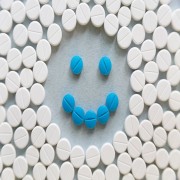The conundrum of antidepressants
A landmark study points to the effectiveness of antidepressant drugs but might rely more on quantity than quality of research

A group of researchers believes that the age-old question of whether antidepressants actually work has finally been put to rest after a large-scale international study found that the 21 most commonly used drugs were all more effective at reducing symptoms of acute depression than placebos.
The study, published in The Lancet in February, analysed data from 522 trials involving 116,477 people. Lead researcher Dr Andrea Cipriani of Oxford University called it "the final answer to a long-standing controversy about whether antidepressants work for depression.”
"We found the most commonly prescribed anti-depressants work for moderate to severe depression, and I think this is very good news for patients and clinicians,” Dr Cipriani told the BBC.
However, Dr Walter Brown, Professor of Psychiatry and Human Behaviour at Brown University, wasn’t so sure. “The authors purport to say that this puts the issue to rest. I don’t think it really does that,” he told Global Health and Travel.
“The thing that’s different about this study is that it’s the largest. On those grounds alone, the authors seem to be saying that because there’s so much data, they have the answer. But it depends on how good the data are that they’re analysing.”
While the claim that antidepressants do work in treating depression is not new, controversy has always surrounded the degree and extent of their effectiveness. For example, doctors don’t even know yet how they work and which patients they work best in. But most psychiatric experts believe that antidepressants are to some extent effective and work better than placebos in some patients.
Even those who most ardently question the value of antidepressants acknowledge that they work in people with the most severe kinds of depression, meaning that the Lancet study revealed little that was startling or new, Dr Brown said.
“If the antidepressants really didn’t work, the regulatory agencies would not have approved them for marketing,” he said. “I know the media has gotten very excited with this study, but there’s nothing startling in it. It wasn’t a bad thing doing this study, but it doesn’t provide us with any new information.”
The new study does contrast, however, with one done by Dr Irving Kirsch of Harvard University in 2008 that showed antidepressants were not much better than placebos, at least in mild to moderate depression.
Detractors have long argued that it’s difficult to conduct reliable clinical studies into the drugs used for depression given that only about 10 percent of depressed people would meet the criteria for entry into such studies since screening typically excludes patients with complicating medical conditions, such as alcoholism, diabetes, heart disease, and high levels of anxiety.
“The kinds of people who are research subjects in clinical trials are not the same people who are treated in clinics and doctors’ offices. They’re a very different population. So it’s very difficult to accurately generalise from the results of a clinical trial to actual clinical practice. That’s something that the authors of this paper don’t discuss,” said Dr Brown.
“One very striking thing is that people who appear to be suicidal are not allowed, but those are the people treated all the time for their depression at clinics and doctors’ offices,” he explained, adding that one needed to be cautious about how much to depend on the results of a clinical trial for actual use in clinical practice.
This story was originally published in the Global Health and Travel issue of March-April 2018.
Related Articles
What’s voice-hearing?
Dr Fernyhough says it’s still a poorly understood phenomenon that carries a strong social stigma
Read moreSigns of early autism might be found in the eyes
Swedish researchers show technique to be accurate as early as just six months of age
Read moreKey questions about ADHD
Dr Lim Boon Leng talks about the symptoms of attention deficit hyperactivity disorder (ADHD) and how to manage it
Read moreLatest Articles
Medical Care
Achieving Swift Recovery: Enhanced Recovery (ERAS) Direct Anterior Approach Total Hip Replacement
Consider total hip replacement with Alps Orthopaedic Centre's ERAS Direct Anterior Approach for faster recovery and reduced hospital stays. Learn about Dr. Jerry Chen's expertise in Singapore.
Read moreMedical Care
Enhanced Recovery (ERAS) Total Knee Replacement
Discover how Alps Orthopaedic Centre's Enhanced Recovery After Surgery (ERAS) approach transforms total knee replacement into a day surgery, offering faster recovery, less pain, and reduced hospital bills. Learn about Dr. Jerry Chen's expertise and schedule your appointment in Singapore.
Read moreMedical Care
Clinical Exercise Physiologist (CEP): The Emerging of Exercise is Medicine
How Exercising can be a Medicine
Read more